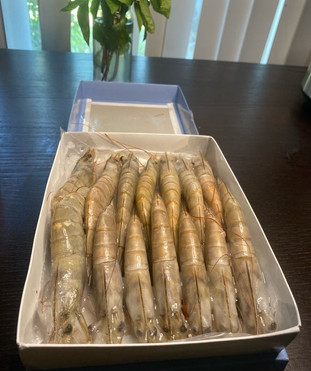Tom Yum Soup on a Budget: Thai Flavors under $12
Updated: Jan 13
Thai hot and sour soup made creamy with coconut milk and filled with succulent prawns.

Everyone seems to love Tom Yum Soup, but many kinds of hot and sour soup exist. Tom Yum Nam Sai is clear soup, while Tom Yum Nam Khon is a creamy variation, made with evaporated or coconut milk. Tom is the Thai word for simmering stock, and Yum is a mix of ingredients. This indicates that it is the most important stock in a good Tom Yum soup. Everything else is just window dressing. You will need some shrimp shells and aromatics to make the best stock.

Tom is the Thai word for simmering stock, and yum is the word for mixing ingredients. It is the stock that makes a first-rate Tom Yum Soup.
The Shrimp or Prawns
When you are cooking on a budget, one of the best ways to save money on shrimp or prawns is to buy them in a minimally processed state. It is possible to buy shrimp whole, with heads on. Use care, as whole shrimp must be flash-frozen to prevent them from becoming soft or off-tasting.

Buy whole shrimp only from sellers you trust. If you can find whole shrimp, they will be frozen. The good news is that many retailers sells this shrimp very cheaply. Wild Fork Foods sells high-quality farmed shrimp for $5.98 per pound. Walmart sells two pounds for under $10, and several other sellers have very reasonably priced whole shrimp.
Defrost overnight in the refrigerator and use immediately.
To clean, hold the shrimp between by the tail end, grasp the shrimp head with the other hand, and pull and twist the head off.


Have a paper towel ready in case it's messy. Remove the shells, leave on the tails, and put shells and heads in a bowl. Put your shrimp in another bowl to be further rinsed and cleaned. Remove shells on all your shrimp, then take the shrimp and rinse under running water. Carefully examine the shrimp and remove the vein on the back with a toothpick. (Experienced types can pull out the vein when they remove the head, but this never works for me.) Get a paper towel and dry each shrimp.

Cleaning the shrimp is messy, but you have perfect, fresh shrimp and enough heads and shells to make a wonderful sauce. Yes, there is some soft, bright orange material in the shrimp's head. This will flavor the sauce. Put the shells in a bowl and retain as much of the innards as possible.
The Aromatics
First, the Lemongrass. You need lemongrass, which you can find cheaply in any Asian grocery. If you can't find lemongrass, you can't make this stock.

I love the flavor of galangal, but if you can't find it, you can substitute ginger root. When I can find one, I buy it and freeze it. Frozen galangal works great.
In terms of Kaffir lime leaves, I sometimes buy fresh, but I keep them both frozen and dried. The ones in the photos of this recipe have been frozen for several months, and they were still perfect. Don't be afraid to freeze your lime leaves. You can buy them dried at any Asian grocery. They make the stock much more flavorful.
Use whatever type of onion you prefer, whether it be yellow, sweet, red, or green. Any of these onions makes a good stock.
Chiles and chile paste
I used one bird's eye Thai chile for chiles, but feel free to use a Jalapeno, a serrano, or no chile at all. It just depends on what you like. I removed the seeds and veins from the Thai chile because it was smoking hot. The right chile and heat level for you is whatever you like.
When you put all these aromatics in the strained stock, they add a mix of wonderful flavors.
The Vegetables
Use what you have, can find, and afford in terms of mushrooms. Oyster mushrooms are great. I added plain old baby Bella mushroom, halved and sliced.
For tomatoes, you can use cherry tomatoes cut in half or cut a Roma tomato into wedges. Use what you have on hand--most any fresh tomato cut into medium-sized chunks will work.
Coconut Milk or Cream
I used full-fat coconut cream in this recipe. Coconut milk or evaporated milk works equally well.









Comments